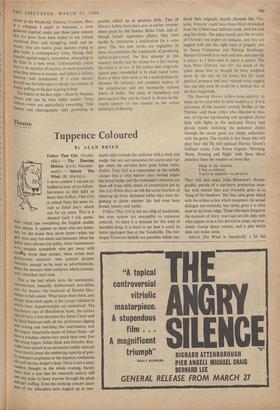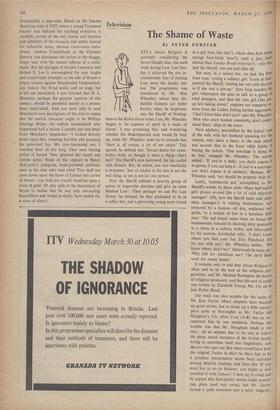Theatre
Tuppence Coloured
By ALAN BRIEN
Follow That Girl, (Vaude- ville.) — The Dancing Heiress. (Lyric, Hammer- smith.) — Inherit The Wind. (St. Martin's.) This is the bait which lures the sentimental, otiventional, basically disillusioned over-fifties Into the theatre—the boyhood of Harold Mac- millan in full colour. What keeps them there, and tempts them back again, is the syrupy solution in Which these daguerreotypes are embalmed. The t°Y-theatre sets of Hutchinson Scott, the tricksy Cute D'Oyly Carte direction (by Denis Carey and bY Basil 'Pattison) with all the performers jigging ,Ind ticking and twitching like marionettes, and ti_he sugary forgettable music of Julian Slade—all nave a mindless charm very much their own. For the young fogies, Julian Slade and Dorothy Rey- nolds have slotted in an occasional mildly satirical revue sketch about the endearing rapacity of pub- lic transport employees or the slapstick confusions of a self-service draper's shop. There is not a nasty modern thought in the whole evening, hardly ni°re than a hint that the twentieth century will one day poke its bony worries through the plush and gilt stuffing. Even the smoking concert sauci- ness of the Alhambra tarts dogged up as mer- maids only reminds the audience with a wink and nudge that sex can sometimes be coarse and vul- gar when the servants have gone below stairs. Follow That Girl is a reassurance to the middle classes that a cosy heaven once existed where the laurel hedge and the tradesmen's entrance cut them off from chilly strain of competition just as The Lily-White Boys served the social function of cheering up those declassed lefties who were be- ginning to doubt whether life had even been brutal, beastly and unfair.
Follow That Girl is not my swig of laudanum, but even opiates are susceptible to consumer research. As there is a demand for this kind of harmless drug, it is hard to see how it could be better packaged than at the Vaudeville. The bur- lesque Victorian ballads are parodies which out- throb their originals. Jaunty choruses like 'Vic- toria, Victoria' could have been lifted untouched from the Gilbert and Sullivan trunk. And the cast sing like birds. The jokes would pass the scrutiny of Christie's top expert on antiques, and they are juggled with just the right kind of gingerly awe by James Cairncross and Patricia Routledge. Marion Grimaldi is as neat and trim and cheerful a canary as I have seen in many a month. The lead, Peter Gilmore, has still too much of the yokel about him as though he were weighted down by the clay on his boots, but his warm physical presence and easy relaxed voice suggest that one day soon he could be a musical star of the first magnitude.
The Dancing Heiress suffers from inability to make up its mind who its ideal audience is. It is a caricature of the musical comedy thriller of the Thirties—and those critics who objected to mix- ture of top-hat tap-dancing and spangled chorus lines with fights in the darkened library and gloved hands switching the poisoned drinks through the secret panel are simply unfamiliar with the genre. The trouble is that those who still play their old 78s will applaud Murray Grand's brilliant mimic Cole Porter beguine 'Morning, Noon. Evening and Night' with those clever pointless lines the maestro so loves like
Deep in my interior, I feel so inferior,
You're so superior—to me-ee-ee.
They will also enjoy John Heawood's choreo- graphic parody of a top-heavy production num- ber with ostrich fans and crocodile grins as in 'Song of the Shadows.' But they soon grow bored with the witless action which recaptures the actual dialogue too minutely, but rarely gives it a witty twist or an ironic edge. Those who have forgotten the musicals of thirty years ago are left only with what appear to be a few derivative songs, an occa- sional clumsy dance routine, and a plot which does not make sense.
Inherit The Wind is theatrically a hit but dramatically a near-miss. Based on the famous American trial of 1925, where a young Tennessee teacher was indicted for teaching evolution, it carefully avoids all the real ironies and tensions and subtleties of the occasion and settles instead for colourful, noisy, obvious court-room melo- drama. Andrew Cruickshank in the Clarence Darrow role dominates the action as the shaggy, sleepy bear with the mental reflexes of a rattle- snake. But the dialogue of Jerome Lawrence and Robert E. Lee is overweighted for easy laughs and comfortable triumphs on the side of Reader's Digest science against Neanderthal fundamental- ism. Inherit The Wind works well on stage, but it left me unsatisfied. I was irritated that H. L. Mencken, perhaps the greatest reporter of this century. should be presented merely as a preten- tious smart-aleck. And you have only to read Mencken's own descriptions of the trial to realise that the central character ought to be William Jennings Bryan—the radical mountebank who hypnotised half a nation. Consider just one detail from Mencken's despatches-1 looked directly down upon him, sweating horribly and pumping his palm-leaf fan. His eyes fascinated me; I watched them all day long. They were blazing points of hatred. They glittered like occult and sinister gems.' None of this appears in Henry McCarthy's pompous, bank-president perform- ance as the man who once cried `You shall not press down upon the brow of Labour this crown of thorns : you shall not crucify mankind upon a cross of gold.' (It only adds to the fascination of Bryan to realise that he was only advocating bimetallism and would probably have settled for a cross of silver.)



















































 Previous page
Previous page